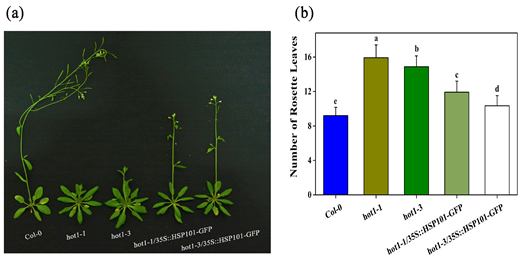Chinese researchers have found a genetic code that may regulate the flowering time of plants, according to the Kunming Institute of Botany under the Chinese Academy of Sciences.
Plants can adjust their flowering time in response to environmental stresses to ensure their reproduction is successful. Scientists believe there could be common regulators controlling plants' response to environmental threats and their flowering time, which need further study.
A research team of the institute studied the role of heat shock protein 101 (HSP101) in controlling the flowering of plants under environmental stresses by using physiological, molecular and genetic methods and found that HSP101 might be one of the common regulators.
The study was recently published in the journal Plant Physiology. (Xinhua)

HSP101 complementation rescues the late-flowering phenotype of hot1-1 and hot1-3 mutants under long days. (a) Flowering phenotypes of rescued lines (hot1-1/35S::HSP101-GFP and hot1-3/35S::HSP101-GFP), the wild type (Col-0) and hot1-1 and hot1-3 mutants. (b) Number of rosette leaves of the rescued lines and Col-0, hot1-1 and hot1-3. More than 40 plants (N?>?40) grown under long days were used for each experiment, and the average value was used. The error bars indicate the standard deviations of three independent experiments. The different letters above the bars indicate significant differences (P?≤?0.01, Least Significant Difference [LSD]). The experiments were performed at least three times, each yielding similar results.
(Editor: YANG Mei)




